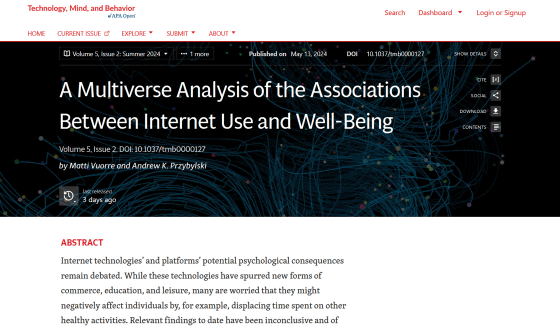Internet use is associated with greater happiness worldwide, Oxford University study finds

Although the Internet and SNS are very convenient, there are reports that excessive use can have a negative effect on mental health and
A Multiverse Analysis of the Associations Between Internet Use and Well-Being Volume 5, Issue 2: Summer 2024
https://tmb.apaopen.org/pub/a2exdqgg/release/1

Internet use statistically associated with higher wellbeing, finds new global Oxford study | University of Oxford
https://www.ox.ac.uk/news/2024-05-14-internet-use-statistically-associated-higher-wellbeing-finds-new-global-oxford-study
Internet use is associated with greater wellbeing, global study finds | Internet | The Guardian
https://www.theguardian.com/technology/article/2024/may/13/internet-use-is-associated-with-greater-wellbeing-global-study-finds
There have been many studies done on the relationship between internet use and happiness, and some have even suggested that the internet may have a negative effect on happiness. However, most of the studies so far have been conducted in developed countries in North America and Europe, and many of them have focused on young people and adolescents, so the scope of the research has been limited.
'There is ongoing debate about internet technologies and platforms and their potential psychological impact, but research to date is inconclusive and limited in geographic and demographic scope. The overwhelming majority of studies have focused on the global north and young people, ignoring the fact that internet adoption is a global phenomenon,' said Andrew Przybylski, professor of human behaviour at the University of Oxford's Internet Institute.
So Przybylski and his team analyzed data collected from people of all ages around the world to examine the relationship between internet use and happiness. 'We set out to address this gap by analyzing how internet access, mobile internet access, and active internet use predict psychological well-being at a global level across life stages. To our knowledge, no other study has directly addressed these issues and addressed the global debate,' Przybylski said.

The data analyzed by the research team was collected by the American market research company Gallup from 2006 to 2021 from a total of approximately 2.4 million people in 168 countries around the world. The subjects ranged in age from 15 to 99 years old, and in the interviews they answered questions about indicators of well-being, such as access to and use of the internet, life satisfaction, social life, purpose in life, and community happiness.
The researchers used 33,792 different statistical models to analyze the association between the internet and happiness, taking into account factors that may affect the outcomes, such as income, education, and health problems. They found that internet access and use, and mobile internet access, are generally associated with higher happiness.
The researchers found that 84.9% of the associations between the internet and happiness were positive, 0.4% were negative, and 14.7% were not statistically significant. They found that people with internet access had an 8.5% higher life satisfaction rating.
It is important to note that this study does not prove a causal relationship between the internet and happiness, but merely clarifies an association, and does not take into account several factors that may be related, such as the amount of time spent on the internet and the purpose of use.

'Overall, the average association between internet adoption and well-being was consistent, with people who had access to or actively used the internet reporting significantly higher levels of well-being than those who did not,' Przybylski said.
Przybylski then mentioned that there has been a growing movement in recent years to regulate internet use by children and young people, and said, 'To make the internet safer for young people, we must not blindly move forward based on strong pre-existing beliefs or one-size-fits-all solutions. We must be sensitive to data and change our thinking,' arguing that we should reconsider the link between the internet and happiness.
Related Posts:
in Web Service, Science, Posted by log1h_ik







